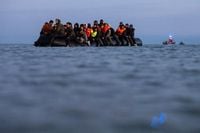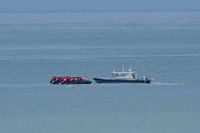On September 24, 2025, a family of three—including a small child—became the first people to arrive in the United Kingdom from France under a new, much-debated “one in, one out” migrant exchange policy. This agreement, negotiated earlier in the year and effective since August, marks a significant shift in how the UK and France handle unauthorized migration across the English Channel, one of the world’s busiest and most dangerous waterways.
The policy, as reported by AP and The Independent, involves Britain returning migrants who arrive without authorization—most commonly by small boats—while France, in turn, sends over vetted asylum-seekers who have applied through legal channels. The Home Office described the arrival of the family as part of "critical first steps" in the new program. In the days preceding this milestone, four people who had crossed the Channel by boat were flown back to France, demonstrating the reciprocal nature of the arrangement.
This pilot program, set to run initially until June 2026, is intended to serve as a deterrent to those considering the perilous journey across the Channel. The British government has made it clear that it hopes the scheme will discourage would-be migrants from risking their lives in overcrowded dinghies. Tragically, dozens have died in recent years attempting the crossing, underscoring the urgency of finding a workable solution.
Despite these efforts, the number of people making the journey remains stubbornly high. According to Home Office figures cited by the BBC, more than 32,000 people have arrived in the UK on small boats so far in 2025, with projections suggesting that the total could surpass last year's figure of 37,000. The sheer scale of arrivals has placed immense pressure on the government and fueled heated debate across the political spectrum.
The “one in, one out” agreement is the centerpiece of Prime Minister Keir Starmer’s strategy to regain control over the migration issue—a topic that has rocketed to the top of the political agenda in recent months. The images of thousands of migrants arriving via small boats have proven politically toxic, and the government is determined to succeed where previous administrations have struggled. As The Independent notes, the prime minister is now under added pressure to prove the scheme’s effectiveness, especially after more than 1,000 migrants arrived by small boat on a single day—Friday, September 19, 2025—just days after returns to France began.
Under the pilot scheme, it is understood that about 50 migrants per week who cross the Channel illegally will be sent back to France. In exchange, Britain will accept the same number of asylum-seekers from France, prioritizing those with family or strong ties in the UK. Initially, only adults are included in the arrangement, as children arriving illegally are not detained under current UK policy.
A Home Office spokesperson summed up the government’s stance, saying, "This is a clear message to people-smuggling gangs that illegal entry into the UK will not be tolerated. We will continue to detain and remove those who arrive by small boat. And we will work with France to operate a legal route for an equal number of eligible migrants to come to the UK, subject to security checks."
The government has also expressed its intention to increase the number of people being sent back under the pilot agreement as the scheme progresses. Officials are looking to speed up the processing of asylum claims and reduce the number of migrants housed in hotels—a practice that currently costs British taxpayers billions of pounds each year.
But the new policy has not escaped criticism. Some argue that the scheme will only address a fraction of the problem, with estimates suggesting that only about one in 20 migrants arriving illegally will actually be sent back to France. Critics contend that this limited scope means the agreement is unlikely to deter the majority of those making the crossing. Furthermore, the continued reliance on hotels to house migrants while their claims are processed remains a contentious and expensive issue.
Political debate around the policy has been fierce. During his recent visit to the UK, former US President Donald Trump weighed in, urging Prime Minister Starmer to "call out the military" to stop the small boats, warning that illegal migration can “destroy” countries. Labour minister Peter Kyle echoed the possibility, stating that the Royal Navy could be called upon if needed to tackle the crossings. However, not everyone is convinced that military intervention would be effective. Former first sea lord Admiral Lord West dismissed Trump’s suggestion, saying it would make “no difference at all” because the UK cannot easily return boats to France.
Meanwhile, the policy has sparked anti-immigrant protests outside hotels housing asylum-seekers, reflecting the deep divisions in British society over how to handle migration. The government’s approach—balancing deterrence with legal pathways for vetted asylum-seekers—aims to address both public concern over unauthorized migration and the humanitarian imperative to offer refuge to those in need.
For those working on the front lines, the stakes are high. The hope is that by demonstrating to would-be migrants that they may be immediately sent back to France, fewer will be willing to risk the perilous journey. Yet, with the numbers still climbing and critics questioning the policy’s reach, the government faces an uphill battle to convince both the public and Parliament that its approach can deliver real results.
As the pilot scheme continues, all eyes will be on the data: Will the number of crossings decline? Will legal routes become more attractive than dangerous, unauthorized ones? And can the UK and France maintain the delicate cooperation needed to make the “one in, one out” policy work in practice?
With the agreement set to run until June 2026, the coming months will be crucial in determining whether this bold experiment in cross-Channel cooperation can truly change the course of the migration crisis—or whether, as critics warn, it will be just another policy that falls short of its ambitions.


